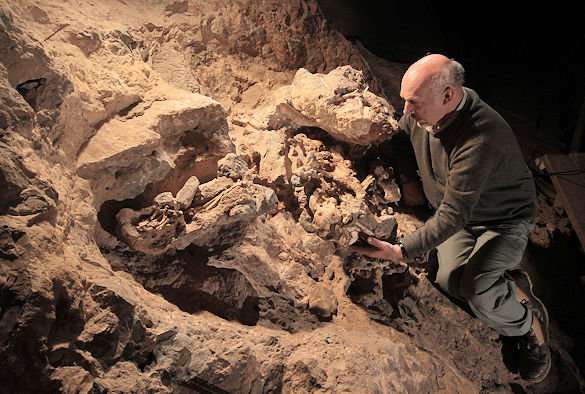LONDON: Human ancestors became efficient upright walkers while they were still substantially tree dwelling, analysis of the world’s most complete skeleton of our early ancestor shows.
The first bones of the 3.67 million old skeleton, specimen StW 573 nicknamed ‘Little Foot’, were 12 foot bones and leg bone fragments identified in boxes in the 1990s.
The over 90 per cent complete skeleton of an old female, Little Foot is a member of the genus Australopithecus, said researchers from the University of Liverpool in the UK.
Australopithecus is a widespread and varied genus of hominins to which the famous Lucy belonged, and which was an early precursor to modern-day Homo sapiens which appeared roughly 300,000 years ago.
Little Foot is the first fossil of Australopithecus ever to have been discovered with its limbs intact.
The study, published in the journal Nature Science, analysed how she would have walked.
“This hominin, for the first time in the fossil record, had longer lower limbs than upper limbs, like ourselves,” said Professor Robin Crompton from the University of Liverpool in the UK.
“This is an important finding, as the slightly older hominin Ardipithecus, which came before Australopithecus, had longer arms than legs — more like other great apes such as the gorilla,” Crompton said.
That means she was being selected for long stride length in bipedalism, researchers said.
Unlike Lucy, ‘Little foot’ had a hip joint like our own, able to transmit large forces from the trunk to the leg and vice versa, they said.
Although Little Foot’s legs were longer than her arms, they had not yet achieved the great relative leg length found in humans, according to the study.
“She would not have been as good at carrying objects as we are. However, she would have been much better at climbing trees than modern humans,” Crompton said.
“It is most likely that she would have resided in an area that was a mix of tropical rainforest, broken woodland and grassland, through which she would roam around. She would have lived primarily on forest fruits and leaves,” he said. (AGENCIES)
Trending Now
E-Paper


